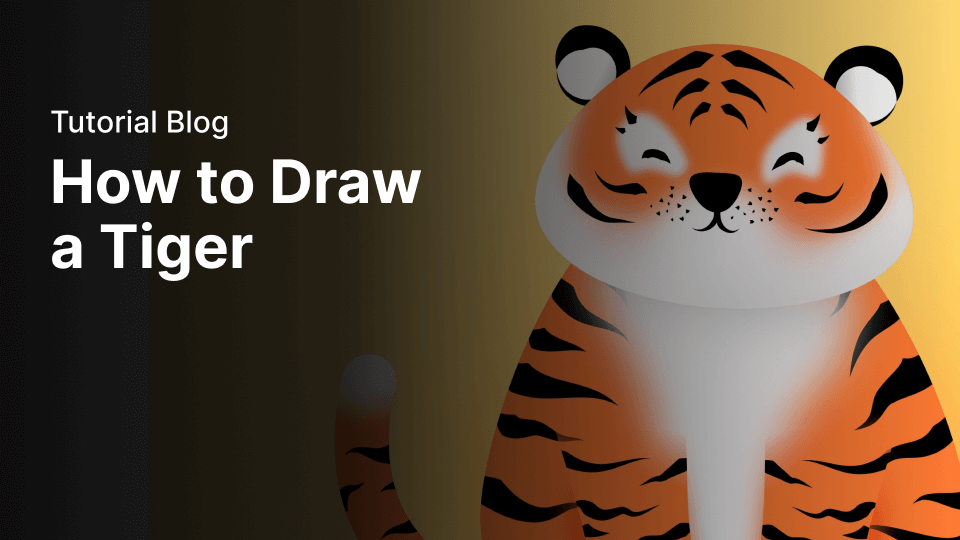Hello, all you cool cats and kittens!
Chinese New Year, also known as the Lunar New Year, starts today (February 1), and 2022 is the Year of the Tiger!
The Tiger ranks third among the animals of the Chinese zodiac. According to legend, the Jade Emperor ordered a race to select the 12 animals to be his personal guards. Although it was fast, the Tiger came third after the Rat—who placed first by being cunning—and the Ox, who placed second for being diligent.
Jumpstart your ideas with Linearity Curve
Take your designs to the next level.
People born in the years of the Tiger (1938, 1950, 1962, 1974, 1986, 1998, 2010, 2022) are known to be fiercely independent, self-assured, loyal, courageous, and have a keen sense for justice. They also have a cute and cheerful side, but it’s only shown to those who know them well. Who wouldn’t want a Tiger friend!?
To celebrate the Year of the Tiger, talented digital illustrator Nastya Kuliábina designed this fantastic tiger drawing and provided a step-by-step guide for how you can create it too. Although it might look complex, this friendly tiger is super easy to draw, and Nastya’s tutorial is a great way to pick up some new Vectornator skills. We aren’t lion!
Ready to finally learn how to draw a tiger? Go get ‘em, tiger!
You can watch the video above or follow the guidelines below.
iPad
Apple Pencil
The latest version of Vectornator
How to use the Pen Tool
How to use the Pencil Tool
How to use the Brush Tool
How to apply a Blur
How to use a Mask
How to create gradients
How to customize brushstrokes
Create the background

Select the Shape Tool and draw a rectangle or square that covers the entire canvas.
Fill it with a gradient (#FFBB00 -> #FFDC88) and adjust the direction of the colors so that the darkest hue is at the lower right corner.
Name this layer “Background” and add a new layer on top.
Draw the tiger head with the Pen Tool

Select the Pen Tool and adjust the settings in the Style Tab so that your Fill is set to a solid orange color (#FF7A33) and the Stroke it off.
Go to your canvas settings and create a 10mm grid. Turn off Snap to Grid. This will provide guide lines for drawing symmetrical shapes.
Unleash Your Creativity with Illustration
Explore a world where art meets functionality. Discover how our illustration tools can transform your creative ideas into stunning visuals.
Draw the tiger head with the Pen Tool and use the Node Tool to perfect the shape. This isn't supposed to be a perfect circle. Try to create the distinct shape in the video.
Draw the nose

How would we draw a tiger face? We'll start by creating the black nose shape using the Pen Tool (like in the previous step) and adjust the nodes to refine it.
Draw the mouth with the Pencil Tool

Select the Pencil Tool and set it to black with a Stroke Width of 2.5 pts. Draw the curved lines like you see in the video.
Draw the whisker spots with the Brush Tool

Select the Brush Tool and set it to the 7th preset with a Stroke Width of 3 pts.
Draw a few freckle-like dots around the tiger’s mouth.
Create white fur on the face

Back to the Pen Tool. Turn the Stroke off and the Fill on.
Draw the shape you see in the video and apply a gradient #FFFFFF -> #BEBEBE.
Add a blur and set it to 6 pts.
Place the shape behind the head, select both objects and apply a Mask.
Create the chin with the Shape Tool

Select the Shape Tool and draw an oval for the tiger’s chin. Apply gradient (white -> transparent).
Adjust the nodes so that the oval is wider at the bottom.
Adjust the mouth

Change the mouth stroke from Regular to Brush and adjust the brush contour so that it’s thinner towards the bottom end.
Draw the eyes with the Pencil Tool

Select the Pencil Tool and switch from Regular to Brush stroke.
Adjust the Stroke Width and contour style to match what you see in the video.
Copy and paste the same style to the other eye.
Create white eye patches with the Pen Tool

Select the Pen Tool and draw the white eye patch shapes behind the eyes. Blur each shape to somewhere between 2 and 3 pts.
Add tiger stripes using the Brush Tool

Select the Brush Tool and set it to a black stroke with the 7th preset.
Change the Stroke Width so the stripes range from thin to thick.
Draw distinctive stripes on the tiger’s forehead, around the eyes, and sides of the face, just like in the video. Refine each one using the Node Tool.
Play around with how you draw the black stripes, making sure to change direction now and then so that the composition is more interesting.
Add cheek blush with the Shape Tool

This adorable tiger is a little shy. Look at him blush!
To add the blush, select the Shape Tool and create two pink circles. Blur both circles to 9.5 pts and turn the Opacity down to 43%.
Add the ears

Select the Shape Tool and set it to the 7th brush preset with a black Stroke and a white Fill.
Create the ears in one easy motion and give each one a gray gradient with the darkest hue closer to the lower right side.
Draw the tiger’s body shape

With the Stroke off and Fill on, use the Pen Tool to draw the tiger’s body.
In the Path Tab, delete two of the nodes to simplify and adjust the curved shape so that it looks like the shape in the video.
Create a subtle gradient (#FF7A33 -> #E1550B) in order to add a shadow between the head and the body.
Draw black stripes on the body

Now, how would we draw the tiger skin? Draw the stripes on the body using the same brush presets as in Step 10. Make sure to change the Stroke Width on a few of the stripes so that not all of the lines are the same.
Place the stripes to the back of the body, select the shapes together, and create a Mask. Now all of your stripes should be neatly clipped to the body.
Create a white belly with the Pencil Tool

Use the Pencil Tool to draw the white fur shape on the tiger’s belly.
Add a gradient to give it dimension, and set the blur to around 10 pt to give the shape a fuzzy, fur-like appearance.
Draw one leg with the Pencil Tool

Select the Pencil Tool and draw one leg as you see it in the video. Give it a gradient (#FF7A33 -> transparent).
Duplicate the leg shape, set it behind the first one, and give it a dark red color. Expand the shape with the Node Tool. Apply a Blur and lower opacity. Now we have a shadow!
Ready to create brand assets that pack a punch?
Visit our Academy for free drawing design courses.
Add stripes on the leg using the Brush Tool, like in step 10. Remember to apply a mask.
Draw the paws and tiger toes

Select the Pen Tool and draw the paw shape. Give it a gradient (white -> transparent) and make sure the white part is towards the bottom of the paw.
Adjust the nodes so that the paw fits over the previously-drawn leg shape.
Draw one toe using the same gradient, but change the direction from left to right. Duplicate the toe twice and move each one into place.
Duplicate the leg and paw

Select the entire leg, paw, and toes and duplicate them.
In the Arrange Panel, flip the shapes horizontally and move the left leg over.
In this step, you can adjust the scale and position of both legs to how you like them.
Draw the tail with the Pen Tool

Draw a gentle curve for the tail with the Pen Tool with a Stroke Width of 26 pts.
Turn the path into Outline and apply a gradient like we did in previous steps.
Use the Shape Tool to draw a white circle over the tip of the tail and blur it to 6 pts.
Draw stripes with the Brush Tool.
Set the stripes and white tip to the back of the main tail shape, and create a Mask.
Create a shadow

Turn your Canvas grid off and make sure your tiger is centered.
Create an oval (F38D34) and apply a Blur at 11 pts. Position it at the tiger’s feet, underneath the rest of the shapes. Now there’s a shadow on the ground.
Add a second blurry oval to give the illustration even more depth.

Roarsome! Your amazing tiger drawing is finally done! What do you think of the finished drawing?
We’ll continue to celebrate Chinese New Year until February 15, when the final day is marked by the Lantern Festival. Follow us on social media for more about the tradition, and keep an eye on our blog for more fun tutorials.
What's your favorite animal? We also have tutorials on How to Draw a Polar Bear, How to Draw a Monkey, How to Draw a Fish, and How to Draw a Dog!
For more drawing tips, head to our Learning Hub, where you'll find in-depth guides for using all of Vectornator's tools.
Jumpstart your ideas with Linearity Curve
Take your designs to the next level.


Share this!
Emma Taggart
Emma is a Content Writer for Linearity in Berlin. Her hobbies include making ceramics, roller skating, drawing, and 2D animation.


:quality(75))
:quality(75))



:quality(75))

:quality(75))
:quality(75))



